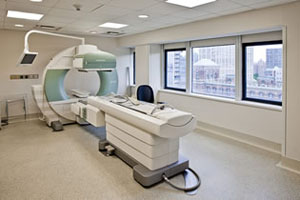Radiation Used in Nuclear Medicine
- Properly used, the benefits of diagnostic nuclear medicine outweigh the risks.
Most nuclear medicine procedures involve using small amounts of radioactive materials to detect or treat diseases.
This page talks about internal radiation therapy. To learn more about external beam radiation therapy, please visit the Radiation Therapy page.
About Radiation Used in Nuclear Medicine

Source: U.S. Centers for Disease Control and Prevention (CDC)
Nuclear medicine procedures help detect and treat diseases by using a small amount of radioactive material, called a radiopharmaceutical. Some radiopharmaceuticals are used with imaging equipment to detect diseases. Radiopharmaceuticals can also be placed inside the body near a cancerous tumor to shrink or destroy it.
A positron emission tomography (PET) scan is an example of a nuclear medicine procedure used to diagnose disease. A PET scan uses a radioactive substance that is inserted into the bloodstream and travels to a specific organ. Doctors use a special camera to watch how the tracer moves. The camera sends information to a computer, which takes pictures as the tracer moves thorough the organ. Doctors use the images to detect problems with the organ.
Radiopharmaceuticals are also used to treat disease by shrinking tumors and killing cancerous cells. During a brachytherapy procedure doctors surgically place small radioactive “seeds” near or inside a cancerous tumor. The radiation from the seeds helps destroy the nearby cancer cells.
Different radioactive elements are absorbed differently by different organs. For example, iodine is absorbed by the thyroid gland, so iodine-131 is used to diagnose and treat thyroid cancer. The doctors choose the best radiopharmaceutical for the part of the body they need to diagnose or treat.
What You Can Do
- Inform your doctor about past treatments. Let the doctor know about other nuclear medicine tests or treatments.
- Tell your doctor if you are pregnant. Let the doctor know if you are pregnant, might be pregnant, or are breastfeeding.
- Discuss the risks. It’s important to talk to your doctor about the risks associated with using nuclear medicine with the doctor or the technician before the procedure.
- Follow all instructions given by the doctor. After certain procedures, patients may need to take extra precautions for a few days as the radiopharmaceutical is eliminated from their bodies. Be sure to talk with your doctor about post-treatment guidelines.
